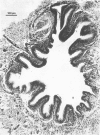Abstract
Human lung bronchiolar segments (about 2 mm long and with a diameter of 0.6-1.5 mm) were dissected and circular muscle tension recorded. Airways were identified by histology and in some preparations by relaxant responses to noradrenaline (0.1-10 microM). Adenosine (1-100 microM) produced only very weak contractions, whereas carbachol (EC50 = 0.40 microM), histamine (EC50 = 0.63 microM), prostaglandin D2 (EC50 = 0.50 microM), substance P (EC50 = 4.6 microM) and ATP (1-100 microM) produced much greater ones. The contractions generally developed rapidly and were stable. The mean maximum increase in tension achieved with the most efficient constrictor, carbachol, was 0.5 g. ATP was the least efficient producing only about 40% of carbachol's maximum. Terbutaline, theophylline and enprofylline relaxed carbachol (2.0 microM = EC70)-contracted preparations. Terbutaline (3-3000 nM) relaxed 4 out of 11 bronchioles. Theophylline (10-4000 microM) and enprofylline (1-400 microM) consistently relaxed the bronchiolar preparations including those exhibiting little responsiveness to the beta 2-adrenoceptor agonist. Since enprofylline (which does not block adenosine receptors) was a five times more potent relaxant than theophylline and since adenosine produced only weak contractions, antagonism of adenosine receptors is probably not involved in relaxation of the small airways. It is suggested that the present data, which apparently differ from those obtained with lung parenchymal strips, are of relevance for human small airways responsiveness.
Full text
PDF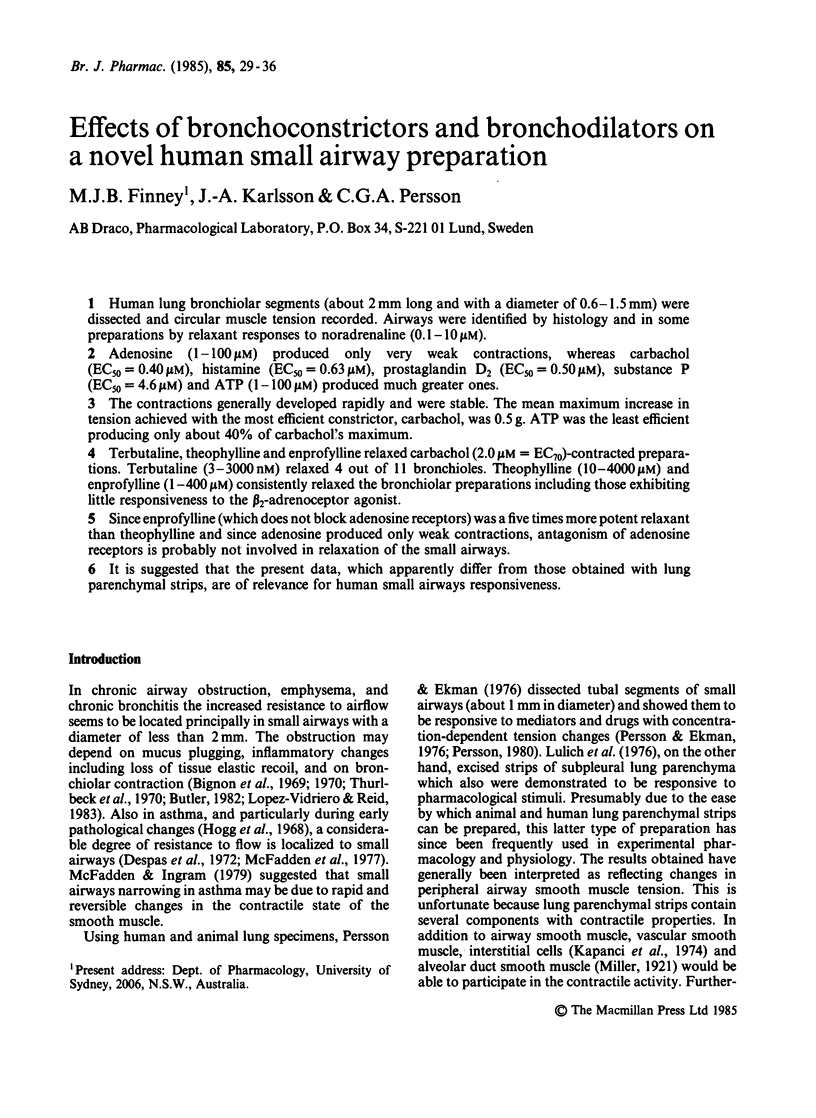
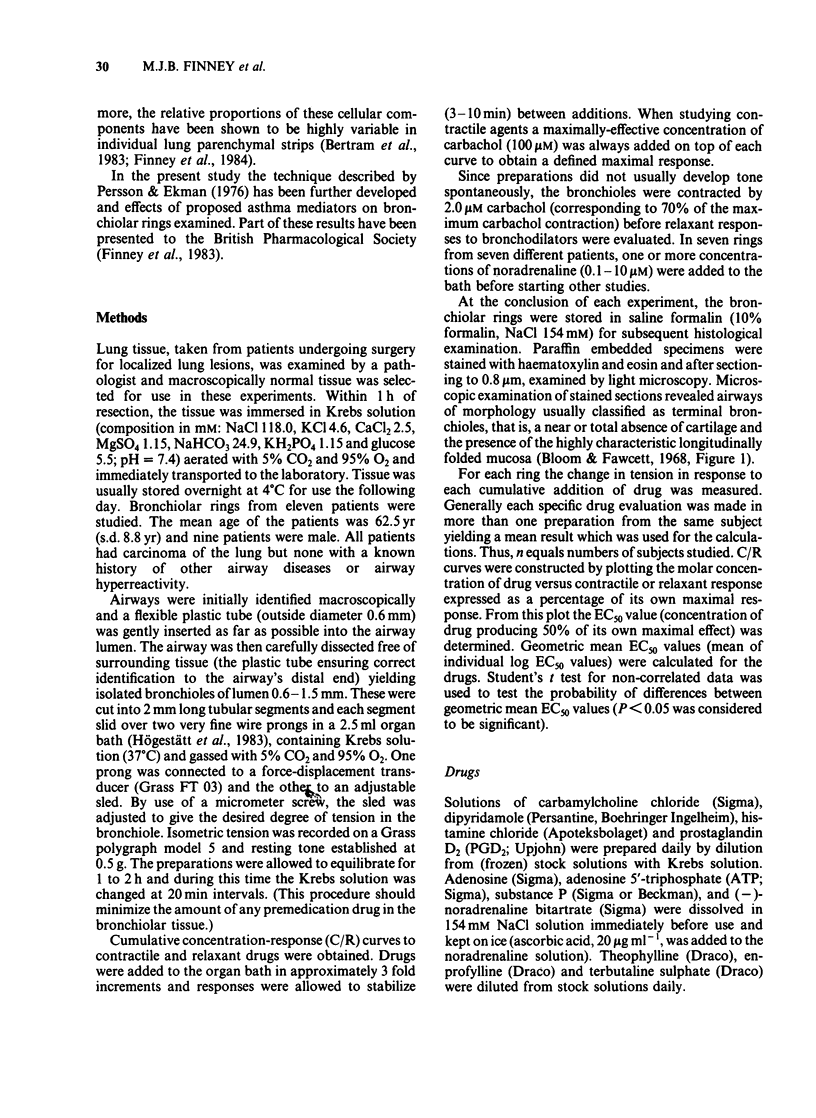
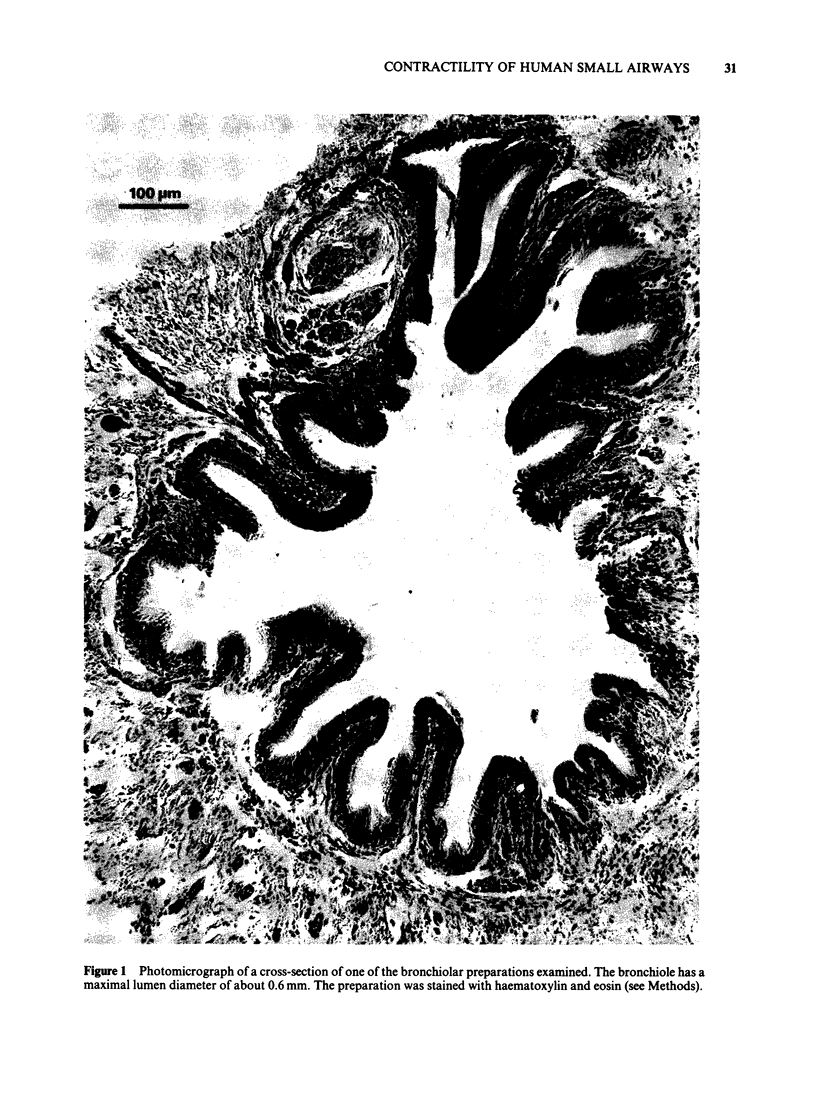
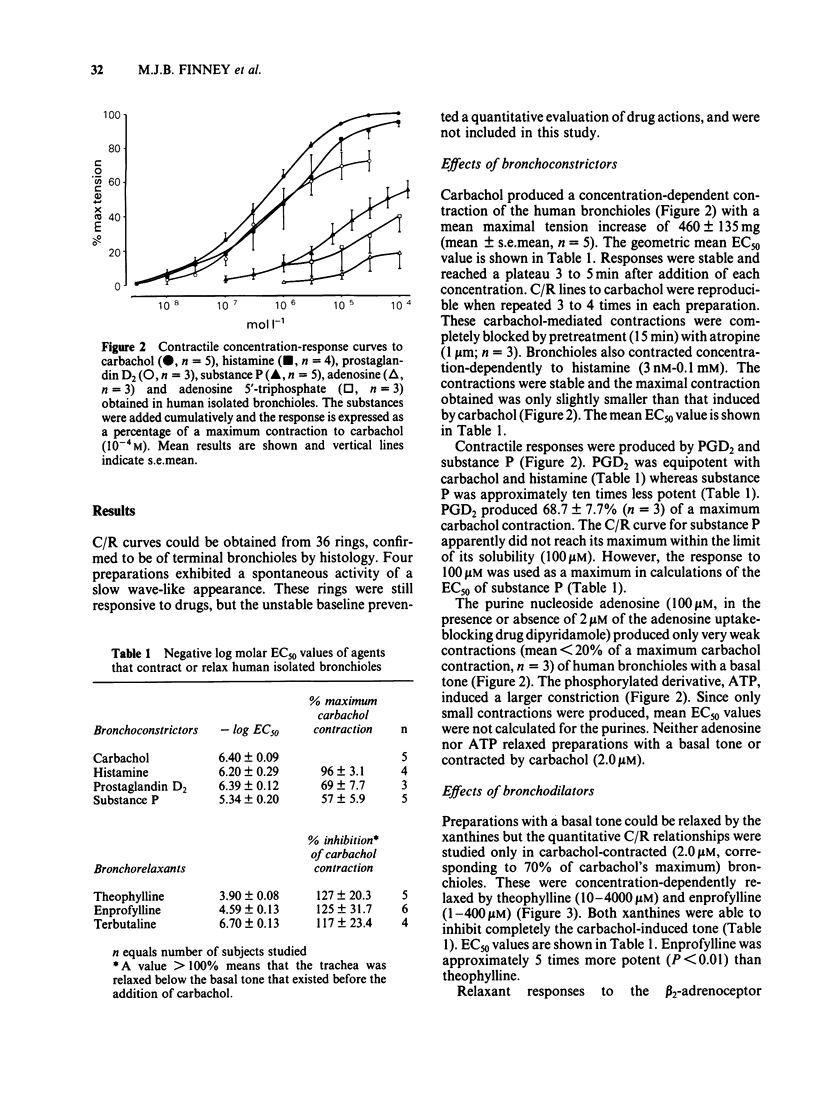
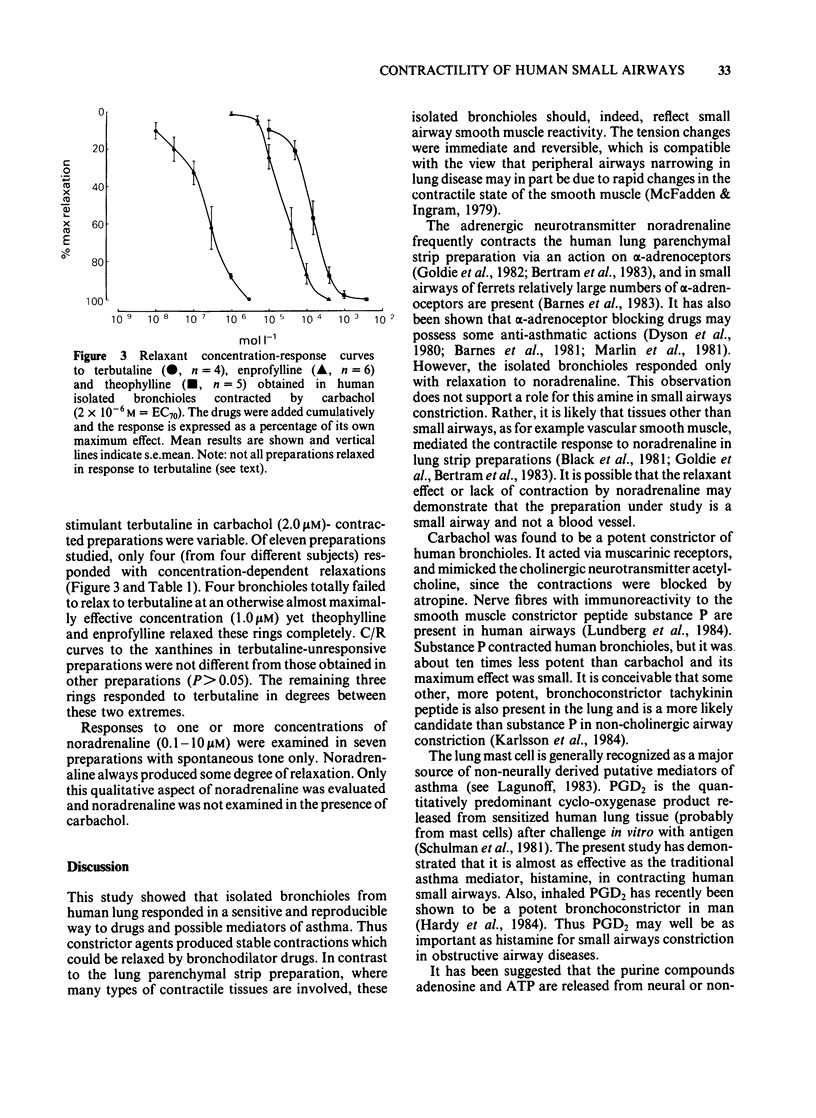
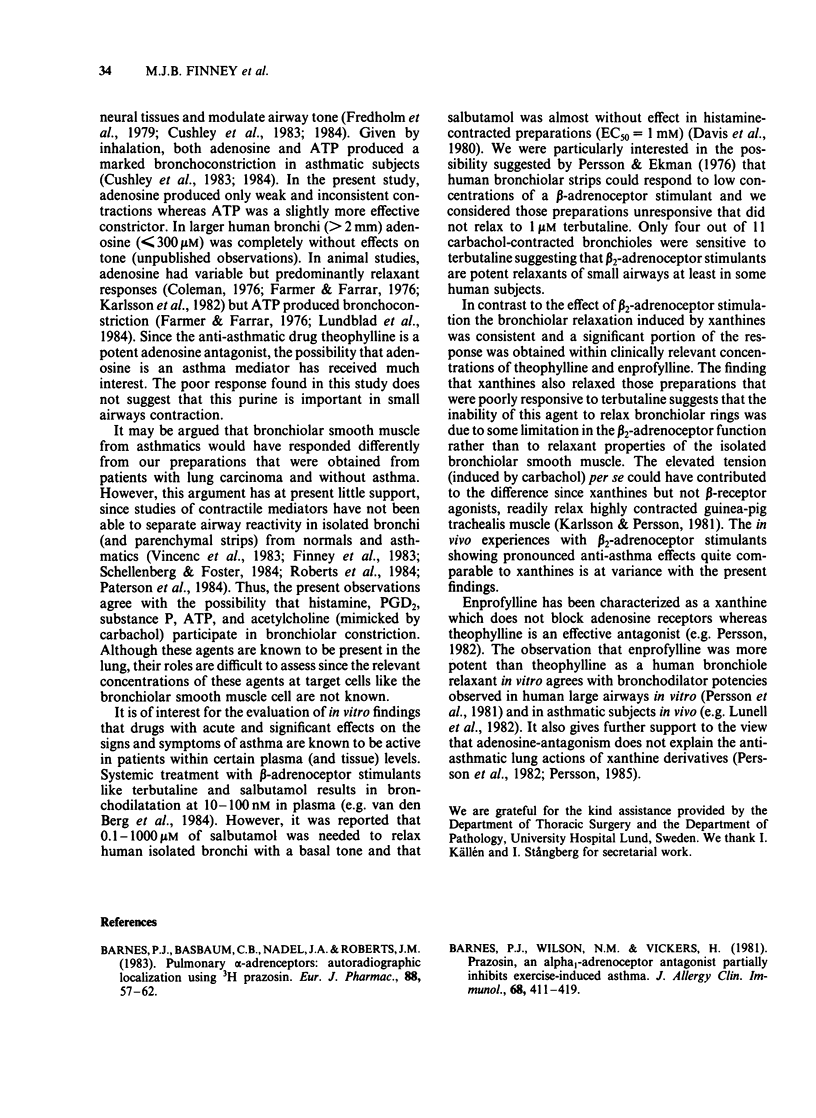
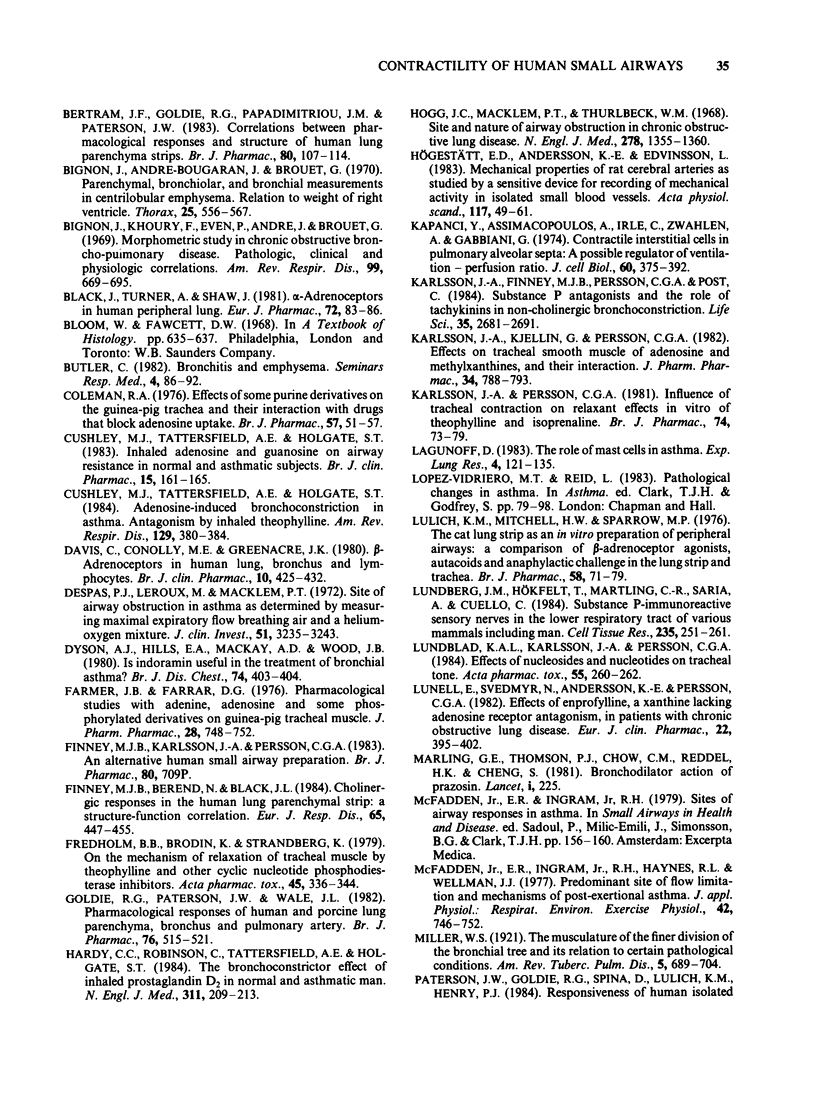
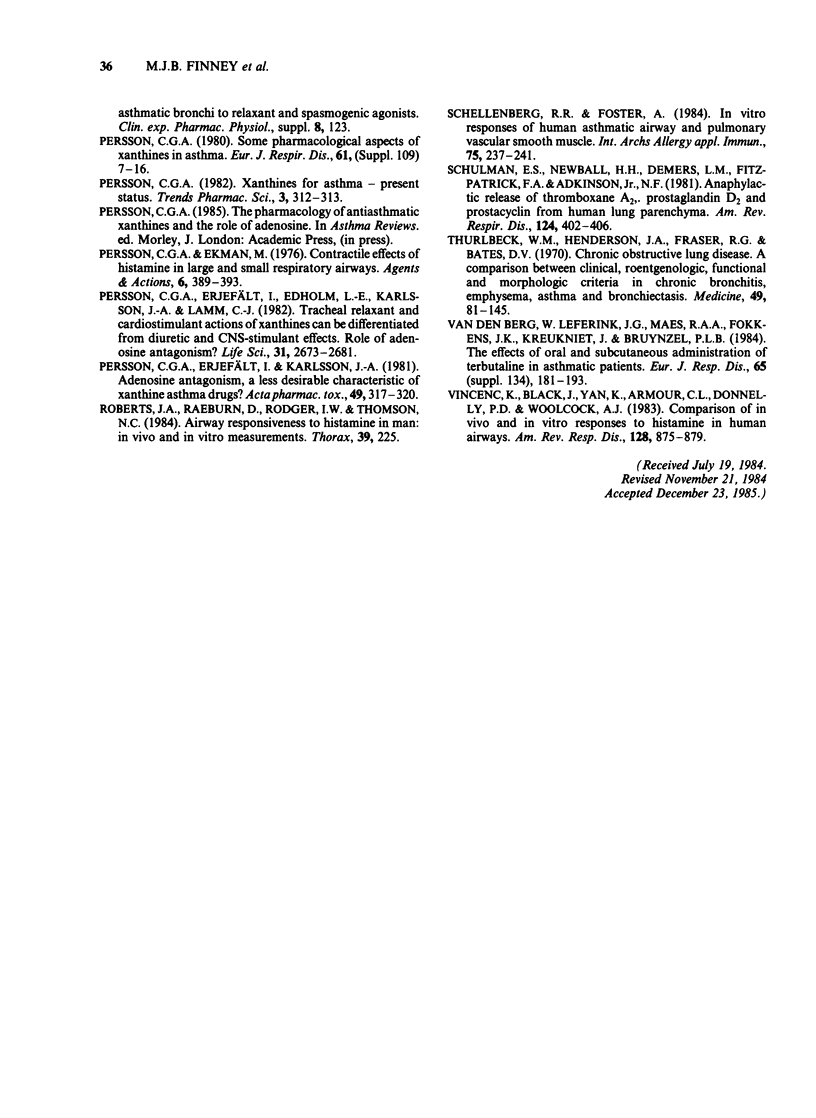
Images in this article
Selected References
These references are in PubMed. This may not be the complete list of references from this article.
- Barnes P. J., Basbaum C. B., Nadel J. A., Roberts J. M. Pulmonary alpha-adrenoceptors: autoradiographic localization using [3H]prazosin. Eur J Pharmacol. 1983 Mar 18;88(1):57–62. doi: 10.1016/0014-2999(83)90391-6. [DOI] [PubMed] [Google Scholar]
- Barnes P. J., Wilson N. M., Vickers H. Prazosin, an alpha 1-adrenoceptor antagonist, partially inhibits exercise-induced asthma. J Allergy Clin Immunol. 1981 Dec;68(6):411–415. doi: 10.1016/0091-6749(81)90193-7. [DOI] [PubMed] [Google Scholar]
- Bertram J. F., Goldie R. G., Papadimitriou J. M., Paterson J. W. Correlations between pharmacological responses and structure of human lung parenchyma strips. Br J Pharmacol. 1983 Sep;80(1):107–114. doi: 10.1111/j.1476-5381.1983.tb11055.x. [DOI] [PMC free article] [PubMed] [Google Scholar]
- Bignon J., Andre-Bougaran J., Brouet G. Parenchymal, bronchiolar, and bronchial measurements in centrilobular emphysema. Relation to weight of right ventricle. Thorax. 1970 Sep;25(5):556–567. doi: 10.1136/thx.25.5.556. [DOI] [PMC free article] [PubMed] [Google Scholar]
- Bignon J., Khoury F., Even P., Andre J., Brouet G. Morphometric study in chronic obstructive bronchopulmonary disease. Pathologic, clinical, and physiologic correlations. Am Rev Respir Dis. 1969 May;99(5):669–695. doi: 10.1164/arrd.1969.99.5.669. [DOI] [PubMed] [Google Scholar]
- Black J., Turner A., Shaw J. alpha-adrenoceptors in human peripheral lung. Eur J Pharmacol. 1981 Jun 10;72(1):83–86. doi: 10.1016/0014-2999(81)90300-9. [DOI] [PubMed] [Google Scholar]
- Coleman R. A. Effects of some purine derivatives on the guinea-pig trachea and their interaction with drugs that block adenosine uptake. Br J Pharmacol. 1976 May;57(1):51–57. doi: 10.1111/j.1476-5381.1976.tb07655.x. [DOI] [PMC free article] [PubMed] [Google Scholar]
- Cushley M. J., Tattersfield A. E., Holgate S. T. Adenosine-induced bronchoconstriction in asthma. Antagonism by inhaled theophylline. Am Rev Respir Dis. 1984 Mar;129(3):380–384. doi: 10.1164/arrd.1984.129.3.380. [DOI] [PubMed] [Google Scholar]
- Cushley M. J., Tattersfield A. E., Holgate S. T. Inhaled adenosine and guanosine on airway resistance in normal and asthmatic subjects. Br J Clin Pharmacol. 1983 Feb;15(2):161–165. doi: 10.1111/j.1365-2125.1983.tb01481.x. [DOI] [PMC free article] [PubMed] [Google Scholar]
- Davis C., Conolly M. E., Greenacre J. K. Beta-adrenoceptors in human lung, bronchus and lymphocytes. Br J Clin Pharmacol. 1980 Nov;10(5):425–432. doi: 10.1111/j.1365-2125.1980.tb01783.x. [DOI] [PMC free article] [PubMed] [Google Scholar]
- Despas P. J., Leroux M., Macklem P. T. Site of airway obstruction in asthma as determined by measuring maximal expiratory flow breathing air and a helium-oxygen mixture. J Clin Invest. 1972 Dec;51(12):3235–3243. doi: 10.1172/JCI107150. [DOI] [PMC free article] [PubMed] [Google Scholar]
- Dyson A. J., Hills E. A., Mackay A. D., Woods J. B. Is indoramin useful in the treatment of bronchial asthma? Br J Dis Chest. 1980 Oct;74(4):403–404. [PubMed] [Google Scholar]
- Farmer J. B., Farrar D. G. Pharmacological studies with adenine, adenosine and some phosphorylated derivatives on guinea-pig tracheal muscle. J Pharm Pharmacol. 1976 Oct;28(10):748–752. doi: 10.1111/j.2042-7158.1976.tb04040.x. [DOI] [PubMed] [Google Scholar]
- Finney M. J., Berend N., Black J. L. Cholinergic responses in the human lung parenchymal strip: a structure-function correlation. Eur J Respir Dis. 1984 Aug;65(6):447–455. [PubMed] [Google Scholar]
- Fredholm B. B., Brodin K., Strandberg K. On the mechanism of relaxation of tracheal muscle by theophylline and other cyclic nucleotide phosphodiesterase inhibitors. Acta Pharmacol Toxicol (Copenh) 1979 Nov;45(5):336–344. doi: 10.1111/j.1600-0773.1979.tb02402.x. [DOI] [PubMed] [Google Scholar]
- Goldie R. G., Paterson J. W., Wale J. L. Pharmacological responses of human and porcine lung parenchyma, bronchus and pulmonary artery. Br J Pharmacol. 1982 Aug;76(4):515–521. doi: 10.1111/j.1476-5381.1982.tb09248.x. [DOI] [PMC free article] [PubMed] [Google Scholar]
- Hardy C. C., Robinson C., Tattersfield A. E., Holgate S. T. The bronchoconstrictor effect of inhaled prostaglandin D2 in normal and asthmatic men. N Engl J Med. 1984 Jul 26;311(4):209–213. doi: 10.1056/NEJM198407263110401. [DOI] [PubMed] [Google Scholar]
- Hogg J. C., Macklem P. T., Thurlbeck W. M. Site and nature of airway obstruction in chronic obstructive lung disease. N Engl J Med. 1968 Jun 20;278(25):1355–1360. doi: 10.1056/NEJM196806202782501. [DOI] [PubMed] [Google Scholar]
- Högestätt E. D., Andersson K. E., Edvinsson L. Mechanical properties of rat cerebral arteries as studied by a sensitive device for recording of mechanical activity in isolated small blood vessels. Acta Physiol Scand. 1983 Jan;117(1):49–61. doi: 10.1111/j.1748-1716.1983.tb07178.x. [DOI] [PubMed] [Google Scholar]
- Kapanci Y., Assimacopoulos A., Irle C., Zwahlen A., Gabbiani G. "Contractile interstitial cells" in pulmonary alveolar septa: a possible regulator of ventilation-perfusion ratio? Ultrastructural, immunofluorescence, and in vitro studies. J Cell Biol. 1974 Feb;60(2):375–392. doi: 10.1083/jcb.60.2.375. [DOI] [PMC free article] [PubMed] [Google Scholar]
- Karlsson J. A., Finney M. J., Persson C. G., Post C. Substance P antagonists and the role of tachykinins in non-cholinergic bronchoconstriction. Life Sci. 1984 Dec 24;35(26):2681–2691. doi: 10.1016/0024-3205(84)90038-9. [DOI] [PubMed] [Google Scholar]
- Karlsson J. A., Persson C. G. Influence of tracheal contraction on relaxant effects in vitro of theophylline and isoprenaline. Br J Pharmacol. 1981 Sep;74(1):73–79. doi: 10.1111/j.1476-5381.1981.tb09956.x. [DOI] [PMC free article] [PubMed] [Google Scholar]
- Lagunoff D. The role of mast cells in asthma. Exp Lung Res. 1983 Feb;4(2):121–135. doi: 10.3109/01902148309055009. [DOI] [PubMed] [Google Scholar]
- Lulich K. M., Mitchell H. W., Sparrow M. P. The cat lung strip as an in vitro preparation of peripheral airways: a comparison of beta-adrenoceptor agonists, autacoids and anaphylactic challenge on the lung strip and trachea. Br J Pharmacol. 1976 Sep;58(1):71–79. doi: 10.1111/j.1476-5381.1976.tb07694.x. [DOI] [PMC free article] [PubMed] [Google Scholar]
- Lundberg J. M., Hökfelt T., Martling C. R., Saria A., Cuello C. Substance P-immunoreactive sensory nerves in the lower respiratory tract of various mammals including man. Cell Tissue Res. 1984;235(2):251–261. doi: 10.1007/BF00217848. [DOI] [PubMed] [Google Scholar]
- Lundblad K. A., Karlsson J. A., Persson C. G. Effects of nucleosides and nucleotides on tracheal tone. Acta Pharmacol Toxicol (Copenh) 1984 Sep;55(3):260–262. doi: 10.1111/j.1600-0773.1984.tb02047.x. [DOI] [PubMed] [Google Scholar]
- Lunell E., Svedmyr N., Andersson K. E., Persson C. G. Effects of enprofylline, a xanthine lacking adenosine receptor antagonism, in patients with chronic obstructive lung disease. Eur J Clin Pharmacol. 1982;22(5):395–402. doi: 10.1007/BF00542541. [DOI] [PubMed] [Google Scholar]
- Marlin G. E., Thompson P. J., Chow C. M., Reddel H. K., Cheng S. Bronchodilator action of prazosin. Lancet. 1981 Jan 24;1(8213):225–225. doi: 10.1016/s0140-6736(81)90105-7. [DOI] [PubMed] [Google Scholar]
- McFadden E. R., Jr, Ingram R. H., Jr, Haynes R. L., Wellman J. J. Predominant site of flow limitation and mechanisms of postexertional asthma. J Appl Physiol Respir Environ Exerc Physiol. 1977 May;42(5):746–752. doi: 10.1152/jappl.1977.42.5.746. [DOI] [PubMed] [Google Scholar]
- Persson C. G., Erjefält I., Edholm L. E., Karlsson J. A., Lamm C. J. Tracheal relaxant and cardiostimulant actions of xanthines can be differentiated from diuretic and CNS-stimulant effects. Role of adenosine antagonism? Life Sci. 1982 Dec 13;31(24):2673–2681. doi: 10.1016/0024-3205(82)90711-1. [DOI] [PubMed] [Google Scholar]
- Persson C. G., Erjefält I., Karlsson J. A. Adenosine antagonism, a less desirable characteristic of xanthine asthma drugs? Acta Pharmacol Toxicol (Copenh) 1981 Oct;49(4):317–320. doi: 10.1111/j.1600-0773.1981.tb00913.x. [DOI] [PubMed] [Google Scholar]
- Persson C. G. Some pharmacological aspects of xanthines in asthma. Eur J Respir Dis Suppl. 1980;109:7–16. [PubMed] [Google Scholar]
- Persson G. A., Ekman M. Contractile effects of histamine in large and small respiratory airways. Agents Actions. 1976 Jul;6(4):389–393. doi: 10.1007/BF01973208. [DOI] [PubMed] [Google Scholar]
- Schellenberg R. R., Foster A. In vitro responses of human asthmatic airway and pulmonary vascular smooth muscle. Int Arch Allergy Appl Immunol. 1984;75(3):237–241. doi: 10.1159/000233622. [DOI] [PubMed] [Google Scholar]
- Schulman E. S., Newball H. H., Demers L. M., Fitzpatrick F. A., Adkinson N. F., Jr Anaphylactic release of thromboxane A2, prostaglandin D2, and prostacyclin from human lung parenchyma. Am Rev Respir Dis. 1981 Oct;124(4):402–406. doi: 10.1164/arrd.1981.124.4.402. [DOI] [PubMed] [Google Scholar]
- Vincenc K. S., Black J. L., Yan K., Armour C. L., Donnelly P. D., Woolcock A. J. Comparison of in vivo and in vitro responses to histamine in human airways. Am Rev Respir Dis. 1983 Nov;128(5):875–879. doi: 10.1164/arrd.1983.128.5.875. [DOI] [PubMed] [Google Scholar]
- van den Berg W., Leferink J. G., Maes R. A., Fokkens J. K., Kreukniet J., Bruynzeel P. L. The effects of oral and subcutaneous administration of terbutaline in asthmatic patients. Eur J Respir Dis Suppl. 1984;134:181–193. [PubMed] [Google Scholar]



